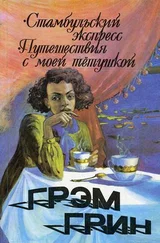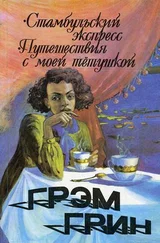Грэм Грин - The Comedians
Здесь есть возможность читать онлайн «Грэм Грин - The Comedians» весь текст электронной книги совершенно бесплатно (целиком полную версию без сокращений). В некоторых случаях можно слушать аудио, скачать через торрент в формате fb2 и присутствует краткое содержание. Год выпуска: 1966, Жанр: Классическая проза, на английском языке. Описание произведения, (предисловие) а так же отзывы посетителей доступны на портале библиотеки ЛибКат.
- Название:The Comedians
- Автор:
- Жанр:
- Год:1966
- ISBN:нет данных
- Рейтинг книги:3 / 5. Голосов: 1
-
Избранное:Добавить в избранное
- Отзывы:
-
Ваша оценка:
- 60
- 1
- 2
- 3
- 4
- 5
The Comedians: краткое содержание, описание и аннотация
Предлагаем к чтению аннотацию, описание, краткое содержание или предисловие (зависит от того, что написал сам автор книги «The Comedians»). Если вы не нашли необходимую информацию о книге — напишите в комментариях, мы постараемся отыскать её.
The Comedians — читать онлайн бесплатно полную книгу (весь текст) целиком
Ниже представлен текст книги, разбитый по страницам. Система сохранения места последней прочитанной страницы, позволяет с удобством читать онлайн бесплатно книгу «The Comedians», без необходимости каждый раз заново искать на чём Вы остановились. Поставьте закладку, и сможете в любой момент перейти на страницу, на которой закончили чтение.
Интервал:
Закладка:
'I don't play poker,' he retorted and twinkled his black eyes at me as much as to say, 'I've caught you there.' He said, 'I always give away too much. In friendly company. I haven't got the knack of hiding what I feel. Gin-rummy's my only game.' He pronounced the title as though it were a nursery game — a mark of innocence. 'You play it?'
'I've played it once or twice,' I said.
'I'm not pressing you. I just thought it might pass the time till lunch.'
'Why not?'
'Steward, the cards.' He gave me a little smile as much as to say, 'You see, I don't carry my own marked packs.'
It really was, in its way, a game of innocence. There was no easy means of cheating. He asked, 'What shall we play? Ten cents a hundred?'
Jones brought to the game his own special quality. He noticed first, he told me later, in what part of his hand an inexperienced opponent kept his discards and by that means he judged how near he was to a gin. He knew by the way his opponent arranged his cards, by the length of his hesitation before playing, whether they were good, bad or indifferent, and if the hand were obviously good he would often propose fresh cards in the certainty of refusal. This gave his opponent a sense of superiority and of security, so that he would be inclined to take risks, to play on too long in the hope of a grand gin. Even the speed with which his opponent took a card and threw one down told him much. 'Psychology will always beat mere mathematics,' he said to me once, and it was certain that he beat me nearly always. I had to have a hand ready made to win.
He was six dollars up when the gong went for lunch. That was about the measure of the success he wanted, a modest win, so that no opponent ever refused him the chance to play again. Sixty dollars a week is not a big income, but he told me that he could depend on it, and it kept him in cigarettes and drink. And of course there were the occasional coups: sometimes an opponent despised so childlike a game and insisted on fifty cents a point. Once in Port-au-Prince I was to see that happen. If Jones had lost I doubt whether he could have paid, but fortune even in the twentieth century does sometimes favour the brave. The man was capot in two columns and Jones rose from the table two thousand dollars the richer. Even then he was moderate in victory. He offered his opponent his revenge and lost five hundred and a few odd dollars. 'There's another thing,' he once revealed to me, 'women as a rule won't play you at poker. Their husbands don't like it — it has a loose and dangerous air. But gin-rummy at ten cents a hundred — it's only pin-money. And of course it increases one's range of players quite a lot.' Even Mrs Smith, who would have turned away, I am sure, with disapproval from a game of poker, sometimes came and watched our contests.
That day at lunch — I don't know how the conversation arose — we got on the subject of war. I think it was the pharmaceutical traveller who began it; he had been he said, a warden in civil defence and he had an urge to recount the usual bomb-stories, as obsessive and boring as other men's dreams. Mr Smith sat with a fixed mask of polite attention and Mrs Smith fidgeted with her fork, while the chemist went on and on about the bombing of a Jewish girls' hostel in Store Street ('We were so busy that night no one noticed it had gone') until Jones broke brutally in with, 'I lost a whole platoon myself once.'
'How did that happen?' I asked, glad to encourage Jones.
'I never knew, 'he said. 'No one came back to tell the tale.'
The poor chemist sat with his mouth a little open. He was only half way through his own story and he had no audience left: he resembled a sea-lion which has dropped its fish. Mr Fernandez took another helping of smoked herring. He was the only one who showed no interest in Jones's story. Even Mr Smith was intrigued enough to say, 'Tell us a little more, Mr Jones.' I noticed that we were all reluctant to give him a military title.
'It was in Burma,' Jones said. 'We had been dropped behind the Jap lines to make a diversion. This particular platoon lost touch with my H.Q. There was a youngster in command — he wasn't properly trained in jungle fighting. Of course in those conditions it's always sauve qui peut. Strangely enough I didn't have a single other casualty — just that one complete platoon, nipped off our strength like that,' he broke off a portion of bread and swallowed it. 'No prisoners ever came back.'
'Were you one of Wingate's men?' I asked.
'The same kind of outfit,' he replied with his recurrent ambiguity.
'You spent a lot of time in the jungle?' the purser asked.
'Oh well, I had a kind of knack for it,' Jones said. He added with modesty, 'I'd have been no good in the desert. I had a reputation, you know, for being able to smell water like a native.'
'That might have been useful in the desert too,' I said, and he gave me a look across the table dark with reproach.
'It's a terrible thing,' Mr Smith said, pushing away what was left of his cutlet — a nut-cutlet, of course, specially prepared, 'that so much courage and skill can be spent in killing our fellow-men.'
'As Presidential Candidate,' Mrs Smith said, 'my husband had the support of conscientious objectors throughout the state.'
'Were none of them meat-eaters?' I asked, and it was the turn now of Mrs Smith to regard me with disappointment.
'No laughing matter,' she said.
'It's a fair question, dear,' Mr Smith gently reproved her. 'But it isn't so strange, Mr Brown, when you think of it, that vegetarianism and conscientious objection should go together. I was telling you the other day about acidity and what effect it has on the passions. Eliminate acidity and you give a kind of elbow-room to the conscience. And the conscience, well, it wants to grow and grow and grow. So one day you refuse to have an innocent animal butchered for your pleasure, and the next — it takes you by surprise, perhaps, but you turn away in horror from killing a fellow-man. And then comes the colour question and Cuba … I can tell you I had the support of many theosophist groups as well.'
'The Anti-Blood Sports League too,' Mrs Smith said. 'Not officially, of course, as a League. But many members voted for Mr Smith.'
'With so much support …' I began, 'I'm surprised …'
'The progressives will always be in a minority,' Mrs Smith said, 'in our lifetime, but at least we made our protest.'
And then of course the usual wearisome wrangle began. The traveller in pharmaceutical products started it — I would like to give him capital initials like those of the Presidential Candidate, for he seemed truly representative, but in his case of a baser world. As a former air-raid warden he regarded himself as a combatant. Besides, he had a grievance; his bomb reminiscences had been interrupted. 'I can't understand pacifists,' he said, 'they consent to be protected by men like us …'
'You do not consult us,' Mr Smith gently corrected him.
'It's hard for most of us to distinguish between a conscientious objector and a shirker.'
'At least they do not shirk prison,' Mr Smith said.
Jones came unexpectedly to his support. 'Many served very gallantly in the Red Cross,' he said. 'Some of us owe our lives to them.'
'You won't find many pacifists where you are going,' the purser said.
The chemist persisted, his voice high with his own grievance, 'And what if someone attacks your wife, what then?'
The Presidential Candidate stared down the length of the table at the stout pale unhealthy traveller and addressed him as though he were a heckler at a political meeting, with weight and gravity. 'I have never claimed, sir, that with removal of acidity we remove all passion. If Mrs Smith were attacked I had a weapon in my hand, I cannot promise that I would not use it. We have standards to which we do not always rise.'
Читать дальшеИнтервал:
Закладка:
Похожие книги на «The Comedians»
Представляем Вашему вниманию похожие книги на «The Comedians» списком для выбора. Мы отобрали схожую по названию и смыслу литературу в надежде предоставить читателям больше вариантов отыскать новые, интересные, ещё непрочитанные произведения.
Обсуждение, отзывы о книге «The Comedians» и просто собственные мнения читателей. Оставьте ваши комментарии, напишите, что Вы думаете о произведении, его смысле или главных героях. Укажите что конкретно понравилось, а что нет, и почему Вы так считаете.



